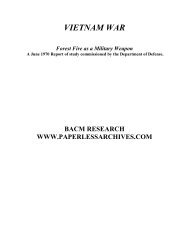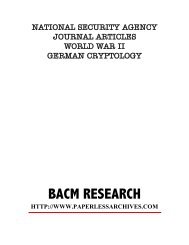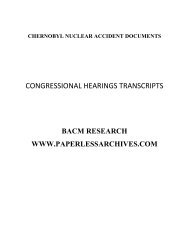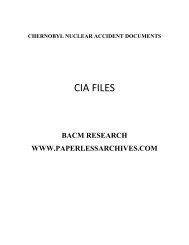- Page 1:
FBI FILES Association of Community
- Page 5 and 6: c fD.340c (4-1l..Q3) FIClldOfficeAc
- Page 7 and 8: .. I , ~.
- Page 9 and 10: ! FD-597 (Rev 8-11-94) Page CY (Of
- Page 11 and 12: ~... -...._ - ~- ~ -.l .... ,...---
- Page 13 and 14: --------~------~ \ I '" / I --
- Page 15 and 16: (~ ?i~_ ________ ~--~~~~~L~~ ~ c;~
- Page 17 and 18: ·To: Re: Seattle From~ Seattle 194
- Page 19 and 20: ~ .. _ • • ....... -_...-- --..
- Page 21 and 22: • • . which would have done qua
- Page 23 and 24: • •• '! -'.' TheACo~fu.illctm
- Page 25 and 26: • @..ev. 01-31-2003) I;;;! • FE
- Page 27 and 28: • • To: Criminal Investigative
- Page 29 and 30: ~ • FD·302a (Rev. 10-6·95) •
- Page 31 and 32: j, • FD-302a (Rev. 10-6-95) • 5
- Page 33 and 34: SEARCHED_______. INDEXEQ..... SERIA
- Page 35 and 36: Voter-registration workers charged
- Page 37 and 38: The Seattle Times: Seven charged in
- Page 39 and 40: The S~attle Times: Seven charged in
- Page 41 and 42: • • 1 CAUSE NO. 2 CERTIFICATION
- Page 43 and 44: 1 • Training and support for ACOR
- Page 45 and 46: 1 C. Pierce County 2 The Elections
- Page 47 and 48: 1 Stephanie Moore, a national ACORN
- Page 49 and 50: 1 C. Voter Registration Application
- Page 51 and 52: 1 E. ACORN Cards Submitted to REALS
- Page 53 and 54: 1 The following lists were compiled
- Page 55: 1 Debwa discussed how she was hired
- Page 59 and 60: • 1 per day. (This was after ACOR
- Page 61 and 62: 1 about a minute and started writin
- Page 63 and 64: • • 1 Greene said that when he
- Page 65 and 66: • • 1 Jayson Woods to use the h
- Page 67 and 68: • • 1 Olson said he and the oth
- Page 69 and 70: • • 1 He said he didn't underst
- Page 71 and 72: • • 1 1762 Cards from the VRDB.
- Page 73 and 74: AUG 1 6 2007 FBI SEAfi!..fi '--_--.
- Page 75 and 76: SEARCHED_______. INDEXEO SERIALlZED
- Page 77 and 78: SEARCHED ________ INDEXEQ..... SERf
- Page 79 and 80: f SEARCHED~ INDEXED _____ SERlALlZE
- Page 81 and 82: SEARCHED_______. INDEXED _____ SEAI
- Page 83 and 84: SHERIFF KING COUNTY Officer 10: Nam
- Page 85 and 86: I SEARCHED~ INDEXE~ SERIAUZED_FILED
- Page 87 and 88: • •
- Page 89 and 90: SHERIFF Officer 10: 05070 Address:
- Page 91 and 92: ~ SEARCHED I'''~'' U -. ~.' SERIAUZ
- Page 93 and 94: cRe~ 01-31-2003) • FEDERAL BUREAU
- Page 95 and 96: , I sEARCllED INDEXEIl.-- SERIAUZEO
- Page 97 and 98: Thompson, Loviss Todd, Joseph Vette
- Page 99 and 100: •• 1 That the defendant TINA MA
- Page 101 and 102: Covell, Malcom Cummings, Cara Curti
- Page 103 and 104: COUNT XII 2 And J, Daniel T. Satter
- Page 105 and 106: • 1 That the defendant JAYSON LEE
- Page 107 and 108:
1 Contrary to RCW 29A.S4.130(l), an
- Page 109 and 110:
• 1 That the defendant KENDRA LYN
- Page 111 and 112:
• Abby Brown, Anathony Brown, Dan
- Page 113 and 114:
• • 1 Jean Villamor, Luke Watts
- Page 115 and 116:
2 • • 3 4 S 6 7 8 9 10 11 12 13
- Page 117 and 118:
• For Further Instructions See: M
- Page 119 and 120:
FD-515 (Rev. 11-10.Q5) ~ Squad supe
- Page 121 and 122:
Page 08/23/2007 • ***************
- Page 123 and 124:
• For Further Instructions See: M
- Page 125 and 126:
FD·515 (Rev. 11·10-05) ~Squad sup
- Page 127 and 128:
Page • 08/23/2007 Case Number: 56
- Page 129 and 130:
• For Further Instructions See: M
- Page 131 and 132:
FD·515 (Rev. 11-10"()5) ~ Squad su
- Page 133 and 134:
Page • 08/23/2007 Case Number: 56
- Page 135 and 136:
• For Further Instructions See: M
- Page 137 and 138:
fa SUPERIOR COURT OF WASHINGTON FOR
- Page 139 and 140:
e IV. ORDER IT IS ORDERED that the
- Page 141 and 142:
'. FIN G E R P,R I N T S RIGHT HAND
- Page 143 and 144:
• STATE OF WASHINGTON, SUPERIOR C
- Page 145 and 146:
Page 02/21/08 16:11:24 02/21/2008 *
- Page 147 and 148:
w.- I 'I. Page 02/21/08 16:11:50 02
- Page 149 and 150:
SPECIAL VERDICT or FINDING(S): (a)
- Page 151 and 152:
4.4 CONFINEMENT ONE YEAR. ORL"ESS:
- Page 153 and 154:
SUPERIOR COURT OJ! W ASBINGTON FORK
- Page 155 and 156:
SpPERIOR COURT OF W ASHlNGTON FORKI
- Page 157 and 158:
FD-515 (Rev. 12-19-06) ~ Squad supe
- Page 159 and 160:
• • SENSITIVE / UNCLASSIFIED
- Page 161 and 162:
DEC 1.32007 CONlMITMENT ISSUED __ -
- Page 163 and 164:
IV. ORDER IT IS ORDERED that the de
- Page 165 and 166:
FINGERPRINTS RIGHT HAND FINGERPRINT
- Page 167 and 168:
STATE OF WASHlNGTON, SUPERIOR COURT
- Page 169 and 170:
Page ( • • 02/25/08 15:21:10 02
- Page 171 and 172:
• • Page 02/25/08 15:21:36 (>
- Page 173 and 174:
• SPECIAL VERDICT or FINDlNG(S):
- Page 175 and 176:
4.4 CONFINEMENT ONE YEAR. OIYLESS:
- Page 177 and 178:
• SUPERIOR COURT OF WASHINGTON-FO
- Page 179 and 180:
• SUPERIOR COURT OF WASHINGTON F:
- Page 181 and 182:
02/25/2008 Case Number: 56C-SE-9357
- Page 183 and 184:
Pai~ ,. 1 02/25/2008 •***********
- Page 185 and 186:
Page .. 02/25/2008 •*************
- Page 187 and 188:
Page ,1" 02/25/2008 •************
- Page 189 and 190:
• • (Rl"V. 06-04-2007) r'i FEDE
- Page 191 and 192:
For Further Instructions See: MAOP,
- Page 193 and 194:
FD-51 Sa (Rev. 6-19.()() (. \~ I ,.
- Page 195 and 196:
'" ~, Sattl>rberg, Interim King Cou
- Page 197 and 198:
1.... ________ ---II~ " b (Rev. 06-
- Page 199 and 200:
Dan.Satterberg, Interim King couniP
- Page 201 and 202:
· Dan., Satterberg, Interini King
- Page 203 and 204:
}pa~ Satterberg, Interim King Coun~
- Page 205 and 206:
(Rev. 05-01-2008) '. UNCLASSIFIED F
- Page 207 and 208:
,j •• UNCLASSIFIED To: Criminal
- Page 209 and 210:
• UNCLASSIFIED To: Seattle From:
- Page 211 and 212:
• •
- Page 213 and 214:
~. • Three members of Mitchell's
- Page 215 and 216:
Page 127 - Duphc-ate Page 123 - Dup
- Page 218 and 219:
Department Of Licensing - IDL Syste
- Page 220 and 221:
Department Of Licensing - IDL Syste
- Page 222 and 223:
AI.,ERT NUMBER: KCSO-FR-07-03 SHERI
- Page 224 and 225:
Department Of Licensing - IDL Syste
- Page 226 and 227:
Department Of Licensing - IDL Syste
- Page 228 and 229:
Department Of Licensing - IDL Syste
- Page 230 and 231:
eg_Query TACOMA WA /I TACOMA WA ACO
- Page 232 and 233:
Voter Registration Names from Shelt
- Page 234 and 235:
Number of Voter Registrations By Da
- Page 236 and 237:
I Total Earning~s::: --------------
- Page 238 and 239:
I Total Earnings: I Total Earnings:
- Page 240 and 241:
Address City ZIP Code State Employm
- Page 242 and 243:
Tacoma 98409 WA Tacoma 98406 WA Tac
- Page 244 and 245:
Gig Harbor 98335 WA b6
- Page 246 and 247:
50 51 52 53 54 55 56 57 58 59 60 61
- Page 248 and 249:
154 155 156 157 158 159 160 161 162
- Page 250 and 251:
Last Name Voter Registration Names
- Page 252 and 253:
Number of Voter Registrations By Da
- Page 254 and 255:
SHERIFF Cas~Number [QJl] -I \ \2\0
- Page 256 and 257:
SHERIFF King County Sheriff KING CO
- Page 258 and 259:
Case #07-120588 July 17, 2007 [cv]
- Page 260 and 261:
Case #07-120588 July 17, 2007 [cv]
- Page 262 and 263:
Case #07-120588 July 17, 2007 [cv]
- Page 264 and 265:
Case #07-120588 July 17, 2007 [cv]
- Page 266 and 267:
Case #07-120588 July 17, 2007 [cv]
- Page 268 and 269:
Case #07-120588 July 17, 2007 [cv]
- Page 270 and 271:
Case #07-120588 July 17, 2007 [cv]
- Page 272 and 273:
Case #07-120588 July 17,2007 [cv] S
- Page 274 and 275:
Case #07-120588 July 17, 2007 [cv]
- Page 276 and 277:
Case #07-120588 July 17, 2007 [cv]
- Page 278 and 279:
Case #07-120588 July 17, 2007 [cv]
- Page 280 and 281:
SHERIFF Officer 10: 05070 Address:
- Page 282 and 283:
SHERIFF Officer ID: 05070 Address:
- Page 284 and 285:
SHERIFF Officer 10: 05070 Address:
- Page 286 and 287:
SHERIFF Officer ID: 05070 Address:
- Page 288 and 289:
SHERIFF Officer ID: 05070 Address:
- Page 290 and 291:
KCSO Case #Unassigned April 24, 200
- Page 292 and 293:
KCSO Case #Unassigned April 24, 200
- Page 294 and 295:
KCSO Case #Unassigned April 24, 200
- Page 296 and 297:
KCSO Case #Unassigned April 24, 200
- Page 298 and 299:
SHERIFF Officer 10: 05070 Address:
- Page 300 and 301:
Steve Hobbs: ... and if it's the ri
- Page 302 and 303:
Case #07-120588 May 24,2007 [ev] Wi
- Page 304 and 305:
Case #07-120588 May 24, 2007 [cv] W
- Page 306 and 307:
Case #07-120588 May 24,2007 [cv] Wi
- Page 308 and 309:
Case #07-120588 May 24,2007 rev] Wi
- Page 310 and 311:
Case #07-120588 May 24,2007 [cv] Wi
- Page 312 and 313:
Case #07-120588 May 24, 2007 [cv] W
- Page 314 and 315:
Witness: Oh yeah. Case #07-120588 M
- Page 316 and 317:
Case #07-120588 May 24,2007 [cv] Wi
- Page 318 and 319:
Case #07-120588 May 24,2007 rev] Wi
- Page 320 and 321:
Case #07-120588 May 24,2007 rev] Wi
- Page 322 and 323:
Case #07-120588 May 24, 2007 [cv] W
- Page 324 and 325:
Case #07-120588 May 24, 2007 rev] W
- Page 326 and 327:
Case #07-120588 May 24, 2007 [cv] W
- Page 328 and 329:
Steve Hobbs: Case #07-120588 May 24
- Page 330 and 331:
Case #07-120588 May 24,2007 rev] Wi
- Page 332 and 333:
Case #07-120588 May 22, 2007 [cv] S
- Page 334 and 335:
Case #07-120588 May 22,2007 [cv] Su
- Page 336 and 337:
Case #07-120588 May 22,2007 [cv] Su
- Page 338 and 339:
Case #07-120588 May 22, 2007 [cv] S
- Page 340 and 341:
Case #07-120588 May 22, 2007 [cv] S
- Page 342 and 343:
Case #07-120588 May 22,2007 [cv] Su
- Page 344 and 345:
Case #07-120588 May 22,2007 [cv] Su
- Page 346 and 347:
Case #07-120588 May 22, 2007 [cv] S
- Page 348 and 349:
SHERIFF Officer 10: 05070 Address:
- Page 350 and 351:
SHERIFF Officer ID: 05070 Address:
- Page 352 and 353:
In 2004 ACORN signed a Joint Effort
- Page 354 and 355:
FE-DERAL BURE-AU OF INVE-STIGATION
















